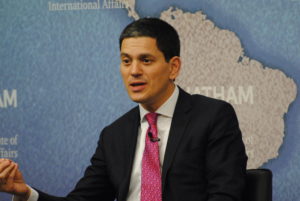David Miliband is President of the International Rescue Committee (IRC). He leads the agency’s humanitarian relief programs in more than 40 countries and refugee resettlement assistance in 28 U.S. cities. Prior to leading the IRC, Miliband was a Member of Parliament in the United Kingdom, serving from 2007 to 2010 as the 74th Secretary of State for Foreign Affairs.
Harvard Political Review: How should countries best respond to refugee migration?
David Miliband: The response of a country like Uganda has been extraordinary. A million South Sudanese have fled into Uganda in the last year and a half. The Ugandans say: here is a plot of land, here is the right to work, here is a school for your kids, here is the right to move around the country. That is the kind of reaction that I think is important overall. Remember, 88 percent of the world’s refugees are in poor countries, not in rich countries. The United States hosts 1 percent of the world’s refugees: the whole of the European continent, 6 percent. Most refugees are in countries like Uganda, Kenya, Jordan, Lebanon, and not in France, Britain, or the United States.
HPR: What actions can the IRC take to help poorer countries?
DM: You might think that poorer countries have a harder time taking in refugees but the poorer countries seem far less militant in their opposition to refugees arriving. As the deputy chairperson in the northern part of Uganda said to me: he is not building a wall. Our contribution as an international NGO is to bring real expertise about water and sanitation in emergencies, about primary healthcare, about educational opportunity with a twist, which is that refugee and displaced children have emotional trauma to deal with that comes before they can learn. Also, [we provide] real expertise in how to help women and girls who are victims of sexual violence. These are not brought as Western ideals. They are developed by local people because the vast bulk of our staff is locally hired and not international aid workers.
HPR: How outward looking should Britain be post-Brexit?
DM: My view is that Britain should be as close to Europe as possible even if it leaves, and that is a route to global engagement and that is true from trade, where Europe has trade deals with around 50 countries outside of the EU, but that is also true on security policy, climate change policy, and it is even true on human rights. I do not see an opposition between European engagement and international engagement, where the Brexiteers would argue that you have to escape from Europe to access the world. I do not see that; I think that it is through Europe that you are most likely to have influence in the world.
HPR: What do you see as the most pressing long-term challenges facing areas affected by the Syrian Civil War, both from a humanitarian and geopolitical perspective?
DM: The biggest challenge for the next three to five years is containing the damage of the Syria Crisis. The Syria Crisis is not over; 40,000 people have been displaced from Idlib in the past two weeks. There is a danger that the fire carries on burning, that the pressure in Lebanon and Jordan grows, that Iraq, while militarily defeating ISIS and Daesh, has not politically defeated it. And of course, there is the humanitarian catastrophe in Yemen that is part of a Middle East on fire for deep reasons of discord about systems of government, about engagement with the outside world, and about religion.
HPR: How have you witnessed the relationship between media and government evolve in the transition into the digital age?
DM: This may make me sound like an absolute granddad: I started in politics when you had a pager rather than a text on your mobile phone, but that was only 20 years ago. But I think there are three things that are absolutely transformative. One, we live in a twenty-four-hour news age that when I entered politics, the next day’s papers were the headlines, and headlines lasted on a newspaper for twenty-four hours. Now, you would be lucky if they last for two hours. The second is that the national conversation is being broken up. The national conversation in America has always been a lot less coherent or weaker than a smaller place, like the United Kingdom. But across the world, conversations are being connected internationally but fragmented nationally. Thirdly, premium of opinion over fact is very strong. Social media has had the effect of leading to a ‘he who shouts the loudest is heard the most’ and ‘he who shouts the most extreme is heard the most,’ which is challenging for consensus-based politics.
Image Source: Wikimedia Commons
This interview has been edited and condensed.
